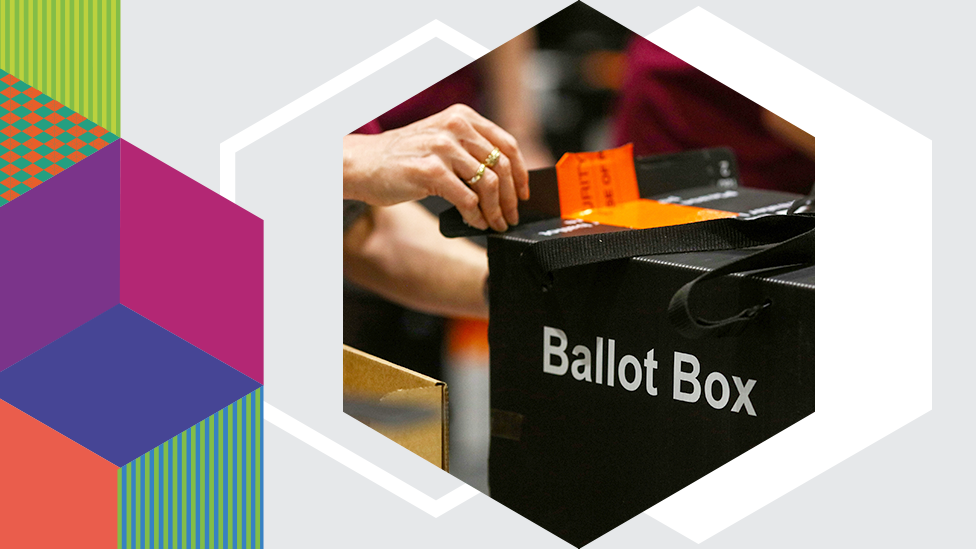What is the London mayoral election?

- Published
On Thursday 2 May, Londoners will head to the polls to elect a mayor and 25 London Assembly members.
It's a chance for the capital's 6.2 million registered voters to decide who will run the city for the next four years.
Who can vote in the election?
The mayor and the London Assembly represent the 8.9 million people who live in the capital.
You can vote if you meet the following criteria and are already on the electoral register:
you live in the capital
you are over the age of 18 on the day of the election
you are a British, European Union (EU) or Commonwealth citizen who does not require leave to remain in the UK
The deadlines to register to vote and to apply for a postal or proxy vote have passed.
It is also too late to apply for a Voter Authority Certificate to use in the May elections.
How do I vote in the election?
If you are registered to vote you (or your designated proxy) can go to your local polling station on 2 May.
You do not need to bring your polling card but you will be asked to provide valid photo ID.
Polling stations will be open between 07:00 BST and 22:00.
If you use a postal vote it must be with your local council by 22:00 on polling day. You can return your ballot papers by post in advance or hand them into a polling station or your local council on the day.
What does the ballot paper look like?
You have three votes: one for the London mayor and two for the London Assembly.
You can vote for one London Assembly member to represent your constituency, and another to represent London as a whole.
The voting system for mayor has changed.
Previously voters listed a first and second preference, but this time you can only vote for one candidate. Under the first-past-the-post system, the candidate with the most votes will win.
The voting system for the London Assembly has not changed.
If you have registered to vote, you will be sent a paper booklet which includes information about the election as well as statements from the mayoral candidates who have chosen to submit one.
Who are the candidates running for London mayor?
The current London Mayor Sadiq Khan is seeking re-election for a third term, and is running against 12 other candidates.
The candidates who are standing, in alphabetical order, are:
Femy Amin, Animal Welfare Party - People, Animals, Environment
Count Binface, Count Binface for Mayor of London
Rob Blackie, Liberal Democrat
Natalie Denise Campbell, Independent
Howard Cox, ReformUK - London Deserves Better
Amy Gallagher, Social Democratic Party
Zoë Garbett, Green Party
Tarun Ghulati, Independent
Susan Mary Hall, Conservative Party
Sadiq Khan, Labour Party
Andreas Christoffi Michli, Independent
Brian Benedict Rose, London Real Party - Transform London
Nick Scanlon, Britain First - No To Immigration
The candidates vying to be the next London mayor
What does the London mayor do?
With a budget of billions, the London mayor fulfils a number of important roles.
The first is transport. They are responsible for Transport for London (TfL) and have the power to set fares, which provides most of TfL's income.
They also have some powers over London roads - the congestion charge and the Ultra Low Emission Zones (Ulez) both came from the mayor's office.
The mayor also influences policing. They set out how London is policed and staffed as well as appointing the Met Police commissioner and holding them to account. Around 30% of the Met's budget comes from the mayor, while the rest comes from national government.
In terms of housing, the mayor sets affordable homes targets. They liaise with local authorities and developers who receive central government funding to build affordable homes.
The mayor has very few direct powers over the economy, but they can support businesses in the capital and control strategic planning, which means they can approve projects that will benefit London.
They also promote London's culture and creative industries. They mayor runs the London Borough of Culture scheme and employs a night czar who champions the capital's nightlife.
However, many day-to-day services such as schools, libraries and rubbish collection are run by individual London councils. Similarly, the NHS, the welfare state and national tax rates are controlled by central government.
What does the London Assembly do?
The London Assembly has 25 members:
14 represent individual constituencies
11 are selected according to the share of votes received by each party in the election for the London-wide assembly member
Assembly members' main power lies in approving or rejecting the mayor's £20.4bn budget plans.
They also work on committees which scrutinise the mayor's policies, and check if they are working.
The London Assembly holds the mayor to account during Mayor's Question Time sessions which are held 10 times a year.
When will voters find out who will be the next London mayor?
Ballot papers will be verified on Friday 3 May, and the votes counted on Saturday 4 May.
The results will be announced at City Hall later on Saturday 4 May.
The mayor and Assembly members take office on the second day after the results are declared, and will serve for four years.
What happened in the London mayor 2021 elections?
Labour's Sadiq Khan beat Conservative rival Shaun Bailey to win a second term.
He had 55.2% of the popular vote, after entering a run-off with Mr Bailey when neither managed to secure a majority in the first round of voting.
The Green Party's Sian Berry came third, while the Liberal Democrats' Luisa Porritt was fourth.
Follow BBC London on Facebook, external, Twitter, external and Instagram, external. Send your story ideas to hellobbclondon@bbc.co.uk, external